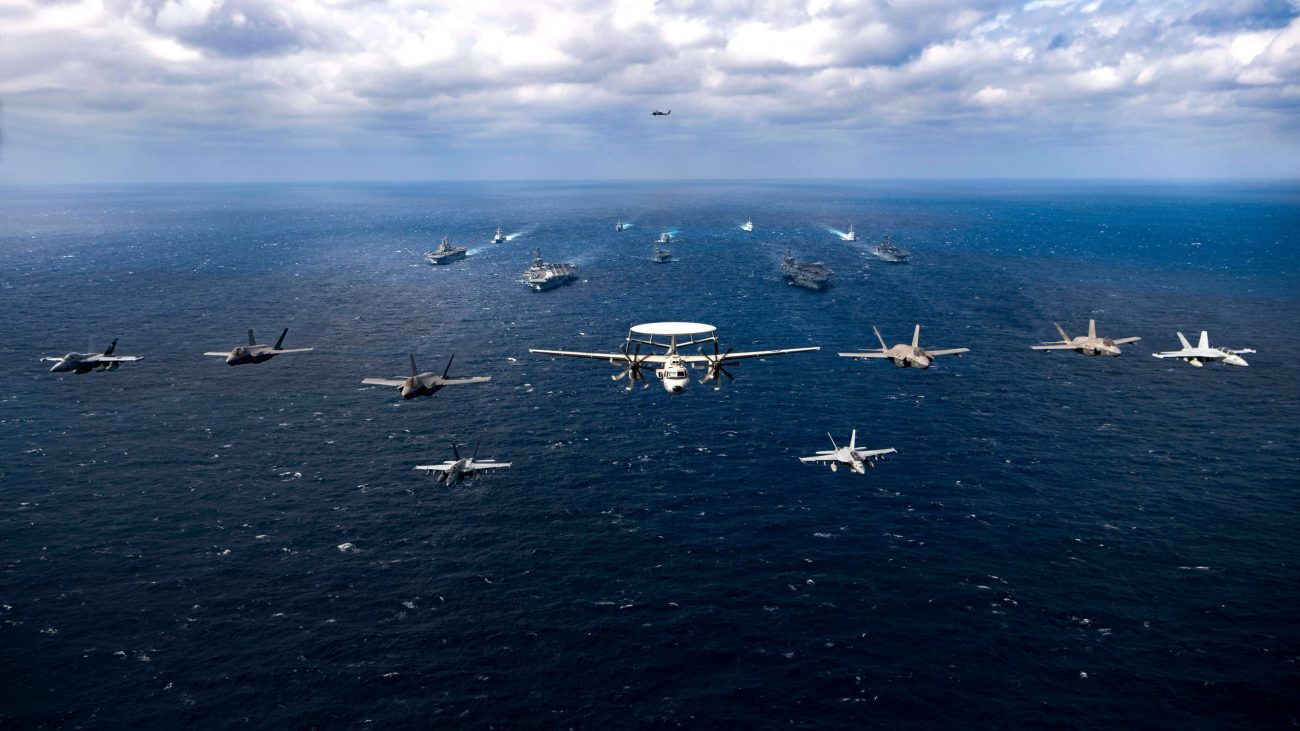Israel established official ties with the United Arab Emirates (UAE) and Bahrain under the 2020 Abraham Accords. However, many other Middle-Eastern countries as well as Pakistan are yet to follow suit.
Russian Su-35, US F-16 Fighters ‘Fight It Out’ Amid Ukrainian Crisis; Escort Each Other’s Recon Planes As War Looms Large
Against this backdrop, the Israeli Navy recently wrapped up a joint exercise with the US Navy. Called IMX 2022 exercise, the military drills also included dozens of countries, including those with which Israel has no formal relations, like Saudi Arabia and Pakistan, The Times of Israel reported.
This was the first time Israel participated in the International Maritime Exercise (IMX 2022) as it grows closer to the US military’s Central Command and its 5th Fleet, which operates in the Middle East’s waterways.
Israel is the closest ally and defense partner of the United States but it had maintained a distance from the 5th fleet due to its differences with other partners of Washington in the Middle East.

“The participation of the Navy in the American exercise demonstrates the strengthening connection between our fleets, based on power, mutual learning, and strategic partnership. We are coordinated and working together with our American partners to prevent terror in the maritime arena and to strengthen the security of the region’s waters,” Israeli Navy chief David Salama said in a statement.
#NavyPartnerships Look Fierce ⚓
Ships participate in a photo exercise during International Maritime Exercise/Cutlass Express (IMX/CE) 2022 in the Arabian Gulf, Feb. 9.
IMX/Cutlass Express 2022 is the largest multinational training event in the Middle East. pic.twitter.com/9rQBDFBA5l
— U.S. Navy (@USNavy) February 14, 2022
Admiral Brad Cooper, the commander of the US 5th Fleet, who met with Salama, Israeli Defense Minister Benny Gantz, and Prime Minister Naftali Bennett over the last month, also lauded the developing relationship between the two militaries.
The IMX 2022, which saw the participation of 60 countries and international organizations, is the largest maritime exercise in the Middle East. It concluded at a ceremony in Manama, Bahrain, on February 17.
During the combined exercise, training evolutions took place in the Arabian Gulf, Arabian Sea, Gulf of Oman, Red Sea, and North Indian Ocean. The United Arab Emirates, Egypt, Kenya, and Oman headed four geographically coordinated task groups of participating naval forces.
The UAE and Bahrain, the two nations with which Israel normalized relations, also took part. Bahrain is a strong US ally and home to the US Navy’s 5th Fleet.
Gulf neighbors Kuwait and Qatar, which likewise have no formal relations with Israel, did not participate, stated Al Jazeera quoting US Navy sources.
The Israeli Navy said it trained with the 5th Fleet in the IMX exercise, simulating the neutralization of naval mines, above and below-water, search-and-rescue operations, and conducting medical exercises at sea, according to The Times of Israel.
For the first time, the Israeli Navy participated with 60 intl navies in 'IMX'—the largest intl naval exercise—led by the @US5thFleet.
'IMX' focused on joint rescue efforts and neutralizing naval threats. We will continue to strengthen regional maritime security with our allies. pic.twitter.com/Vk55S6LCIT
— Israel Defense Forces (@IDF) February 17, 2022
The Israeli navy’s 3rd Flotilla, which operates missile ships, the 915th Patrol Boats Squadron, and the Unit for Underwater Fighting, known by its Hebrew abbreviation YALTAM, participated in the Red Sea practice.
Is US Acting As A Bridge?
Participants of these drills included a number of countries that Israel does not have formal ties with, such as Saudi Arabia, Oman, Comoros, Djibouti, Somalia, Yemen, and Pakistan.
These countries have refused to recognize or establish any ties with Israel after the 1948 Arab-Israel War that led to Israel occupying most of the Palestinian territory. It was only through the 2020 historic accord that the UAE and Bahrain normalized their relations with the Jewish nation.
Saudi Arabia is a close partner of America but desisted from signing an official agreement with Israel. In fact, both Saudi Arabia and Pakistan have unequivocally condemned what they refer to as “flagrant violations” in Palestine, especially in the Gaza crisis of 2021.
On the other hand, after the signing of the peace accords, there have been enhanced economic and military activities between these select Gulf States and Israel.
Naftali Bennett, the current Israeli Prime Minister, made his maiden visit to the UAE in December last year and to Bahrain this week. Israeli defense manufacturer Elbit Systems also opened a subsidiary in the UAE, in a first.
PM Bennett: "We want to fill this relationship with substance in energy, in drive, in economy, in tourism and in the regional architecture. We spoke about opportunities where we can strengthen the bridge, and I really like the name Abraham Accords." pic.twitter.com/sYC5iOzMDZ
— Prime Minister of Israel (@IsraeliPM) February 15, 2022
Israel, the United States and the Gulf-Arab countries share a common concern — Iran which is believed to be the reason behind the American effort at bridging the gap between the disgruntled states. Iran-backed Houthi rebels regularly carry out strikes on Saudi Arabia and the UAE, a coalition that is fighting them in Yemen.
Israel considers Iran as the biggest threat to its security and has threatened to carry out strikes on its nuclear facilities. It has gone so far as to advocate permanent abandonment of the nuclear deal with the US and the imposition of more sanctions on Tehran.
The United States, invested in talks with Iran under a more accommodative Biden administration, potentially expects to bridge the gap that exists between its allies in the Middle Eastern region to strengthen security. Further, it could also be seeking to enhance its own influence in the region that some experts have claimed, is on the wane.
- Contact the author at sakshi.tiwari9555@gmail.com
- Follow EurAsian Times on Google News